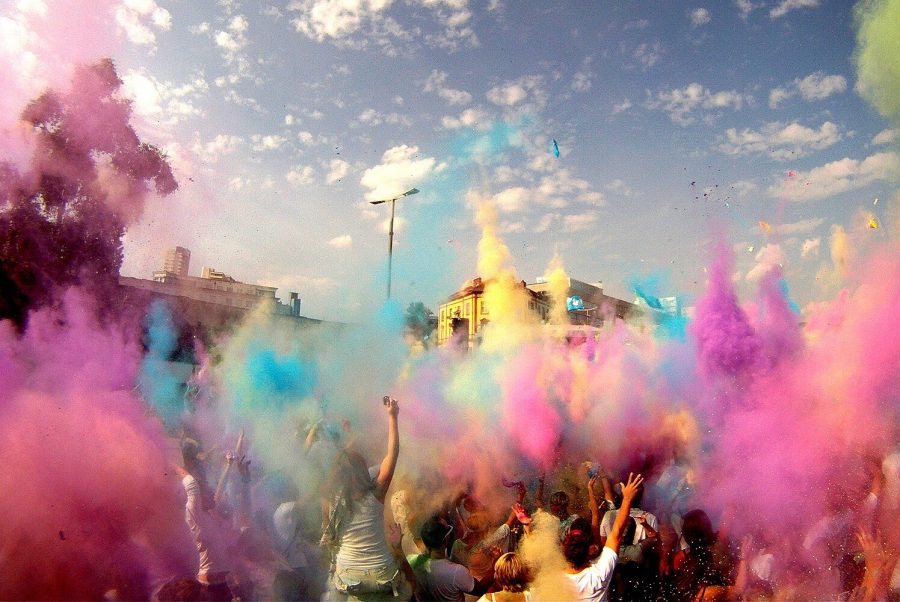A Not So Happy Holi
Johanna Drouin/EyeEm/Getty Images
Though Holi (also known as the festival of colors) is often a fun time for Hindus and others who celebrate during spring, it has acted as a super-spreader for the coronavirus as many people have ignored safety precautions.
April 12, 2021
With the arrival of spring, Indians all over the world have begun to celebrate the auspicious holiday of Holi. Known as the festival of colors or love, Holi is a widely honored day celebrated by Hindus, a majority ethnic community originated in India. This famous festival celebrates the end of winter, the approach of spring, and the devotion for Hindu culture. It also commemorates the beginning of harvest season, hoping for a prosperous yield. Festivities of this day primarily include the gathering of hundreds of thousands, if not millions, of people to throw colored powder or to spray colored water at each other. The boisterous activities bring joy, fun, and laughter for everyone involved.
However, several traditional Holi celebrations and festivities have been halted due to current circumstances involving a pandemic. As a popular holiday, Holi garners the attention of large groups of people; not the ideal situation when COVID-19 is happening. Even with masks or other standard precautions, the risk of infection is much too high; Holi is an ideal infective event for COVID-19. Therefore, in many places around the world, festivities and gatherings have been banned or highly restricted to a small number of people. The same can be said for the states in India.
Unfortunately, these warnings and restrictions on festivities have been ignored. People gathered in large groups for Holi celebrations, breaching many safety precautions. As a result, the number of confirmed COVID-19 cases has greatly increased. From under 10,000 cases in February, cases have now exceeded over 60,000 over the past week in India. The gathering of a large number of people is not the only factor contributing to an increase in cases, the colored powder used in festivities is also responsible.
“The very crux of the festival is the application of colors on each other by the use of hands. This clearly violates the physical distancing rule which should be followed strictly,” expresses Neeraj Nischal, assistant professor of medicine at AIIMS- New Delhi.
Yet despite these restrictions on normal festivities, Holi can still be celebrated, albeit in different ways. Holi itself is a religious holiday that can be celebrated through worship or at-home rituals. The festivities often associated with this holiday do not define it.
T Jacob John, former director of ICMR’s Centre of Advanced Research in Virology, agrees with this statement.
“Unrestricted celebrations and partying joyously should be avoided along with the use of colors, and children and senior citizens should refrain from meeting a large number of people, exchanging gifts, shaking hands, or consuming cold food or beverages. But these precautions have nothing to do with the holiday itself. The religious aspect of the festival can be solemnized as usual ,” he stated.
Rather than large celebrations with a large number of people, smaller gatherings can also be conducted at home, with no more than a few people per each household. In this way, those who may not be inclined to religious ceremonies or practices in comparison to throwing powder at one another.
“Usually my family and I go to an annual Holi celebration at the temple or a popular venue. However due to current circumstances, we just prayed at home. But since we also wanted to do the normal festivities related to Holi, we played with the leftover powder we had at home in the backyard. It was not nearly as loud or crowded as it usually is, but it was just as fun,” exclaims IB freshman Ananya Vishwakarma.
IB sophomore Jiya Bhatt claims she did something similar: “In the past, I’ve celebrated Holi by spending time with my family and friends in the park, where we would play games with the colorful corn-flour powder. This year, we resorted to staying home and just cooking our traditional meals. We called our friends and spoke over the phone.”
Overall, one thing can be confirmed. As a major holiday, one cannot ban Holi from being practiced. However, avoiding the social outdoor aspect and focusing solely on the religious aspect is highly recommended.





















